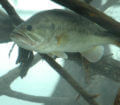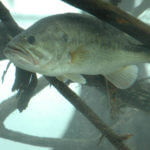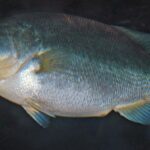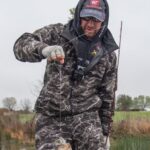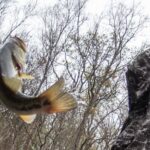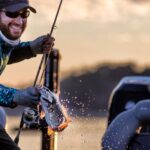Editor’s Note: During the spring of the year, high water and cool weather are often a nightmare for fishermen. However, if you’re like me, you have to fish when you have a chance to fish. You can’t change the fishing conditions. So, you need to learn to fish in bad weather and bad water conditions. In 3 days this spring, Center Hill Reservoir in central Tennessee had risen 16 feet. My friend, outdoor writer and guide, Jim Duckworth, had invited me to bass and crappie fish at Center Hill. My favorite tool I learned about there was a StowMaster (https://www.norsemenoutdoors.com/product-category/stowmaster/) Tournament Series foldable dip net that I’ve really enjoyed using. We were staying at Edgar Evins State Park (http://tnstateparks.com/parks/about/edgar-evins) – a beautiful resort overlooking the lake. The weather had been in the 70s. So, I only had packed one pair of blue jeans. The rest of my wardrobe consisted of shorts and t-shirts. I sure was glad I’d packed my Browning (www.browning.com) Gore-Tex lightweight rain suit. It kept me dry and warm. My guide for the day was David Bell from Murfreesboro, Tennessee.
 “Center Hill Reservoir is a deep, clear impoundment,” Bell said. “You can catch bass on this lake in water 2-feet deep or 30-feet deep. We’ve had 3 days of rain, and the water has come up 16-feet high.”
“Center Hill Reservoir is a deep, clear impoundment,” Bell said. “You can catch bass on this lake in water 2-feet deep or 30-feet deep. We’ve had 3 days of rain, and the water has come up 16-feet high.”
We started fishing on the lower end of the lake not too far from the dam on underwater pea gravel ridges with some chunk rocks on them. “The smallmouths are coming off their beds,” Bell reported. “They’re feeding to gain back their weights after the spawn, and they haven’t moved to deep water yet. We’ve been catching these smallmouths on relatively-shallow long gravel points. As the water comes up, the bass will move back and forth between the 2-foot water and the points. Center Hill homes largemouths, smallmouths and a lot of spotted bass.”
Not only had the water come up 16 feet, but the temperature had dropped 30 degrees overnight. Bell’s first strategy was to fish the new water that just had come into the lake. He thought that maybe the smallmouths would have moved into some of that newly-inundated water in the backs of the coves and pockets. Generally, when a lake or a reservoir floods in the spring, fishing new water is your best tactic for catching bass. Usually, the new water contains plenty of microscopic animals that shad can feed on, and the bass will follow the shad. In the spring when the water rises, the water usually will be warm in the backs of those shallow pockets and coves. But on this particular trip, the water hadn’t warmed up. Also in flood conditions, another thing that usually happens is that the people who control the dams will start pulling current. Yet another problem that we faced at Center Hill was the dams at both ends of the lake were releasing water. So, even though a current was running through the lake, about as much water was coming into the lake as was leaving the lake. “Under these conditions, that’s when I move out onto the points and start fishing points to find and catch bass,” Bell said.
 Bell started off fishing the points with a Carolina rig, and I wanted to know why. “I can cover a lot of bottom very efficiently with a Carolina-rigged plastic worm or lizard, and I also can cover that water fairly quickly,” Bell explained. “Normally, I’ll be fishing a jig at this time of the year. However, I’ve thrown a jig early in the morning before and not gotten a bite. When bass are on points and won’t bite a jig, they often will bite a Carolina-rigged worm.” Yet another advantage to fishing the Carolina rig is that anglers can feel the bottom much better. When they locate a school of bass, they can slow-down their presentations and probably catch more bass out of that same school on a Carolina rig. “If my Carolina rig comes over a big rock, I’ll jiggle my rod tip,” Bell recommended. “This action causes the worm to dance. If a bass is holding on that rock, it usually will eat the worm. Sometimes, I’ll throw a trick worm behind the Carolina rig or a soft-plastic craw. You’ve got to let the bass tell you what bait and presentation they want. When you catch them, they’re telling you what’s working.”
Bell started off fishing the points with a Carolina rig, and I wanted to know why. “I can cover a lot of bottom very efficiently with a Carolina-rigged plastic worm or lizard, and I also can cover that water fairly quickly,” Bell explained. “Normally, I’ll be fishing a jig at this time of the year. However, I’ve thrown a jig early in the morning before and not gotten a bite. When bass are on points and won’t bite a jig, they often will bite a Carolina-rigged worm.” Yet another advantage to fishing the Carolina rig is that anglers can feel the bottom much better. When they locate a school of bass, they can slow-down their presentations and probably catch more bass out of that same school on a Carolina rig. “If my Carolina rig comes over a big rock, I’ll jiggle my rod tip,” Bell recommended. “This action causes the worm to dance. If a bass is holding on that rock, it usually will eat the worm. Sometimes, I’ll throw a trick worm behind the Carolina rig or a soft-plastic craw. You’ve got to let the bass tell you what bait and presentation they want. When you catch them, they’re telling you what’s working.”
David Bell, a tournament fisherman for 24 years, fishes BFL (Bass Fishing League) (https://www.flwfishing.com), ABA (American Bass Anglers) (https://www.americanbassanglers.com/), numbers of local Tennessee tournaments, like Shriners and Lions Clubs, the Fishers of Men circuit (http://www.fomntt.com/), and the Nissan Tournament Trail, as well as a couple of Bass Federation Tournaments (http://bassfederation.com). Percy Priest is Bell’s home lake, and he fishes Old Hickory too in north/central Tennessee. Although Bell guides some, he considers bass fishing a stress release for him. “I like to fish by myself, and when I’m going to fish a tournament, I like to pre-fish by myself. I like the team tournament trails, because I enjoy fishing with someone in the boat during a tournament; but during practice, I like to fish by myself.”
- David Bell on What to Fish for Bass on Rising Water – https://youtu.be/mNAzATPm1Go
- In High Water, Downsize Your Line and Bait to Catch More Bass – https://youtu.be/P5rebO6di34
- Why Fish Points for Bass When the Water’s Rising in the Spring – https://youtu.be/3wwC5ePGoAI
To learn more about bass fishing and get John E. Phillips’ Kindle eBooks, print books and audiobook on bass fishing, go to https://johninthewild.com/books/#bass, or for Nook books, visit www.barnesandnoble.com.


